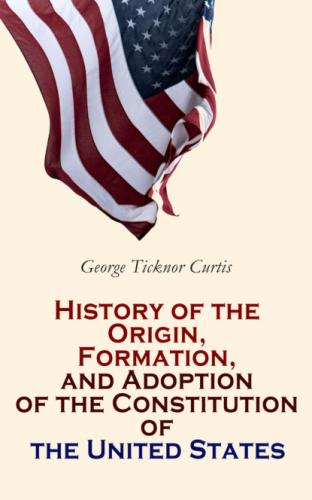George Ticknor Curtis
History of the Origin, Formation, and Adoption of the Constitution of the United States
Complete Edition (Vol. 1&2)
e-artnow, 2020
Contact: [email protected]
EAN: 4064066389611
Table of Contents
VOLUME 1
Table of Contents
PREFACE.
A special history of the origin and establishment of the Constitution of the United States has not yet found a place in our national literature.
Many years ago, I formed the design of writing such a work, for the purpose of exhibiting the deep causes which at once rendered the Convention of 1787 inevitable, and controlled or directed its course and decisions; the mode in which its great work was accomplished; and the foundations on which our national liberty and prosperity were then deliberately settled by the statesmen to whom the American Revolution gave birth, and on which they have rested ever since.
In the prosecution of this purpose I had, until death terminated his earthly interests, the encouragement and countenance of that illustrious person, whose relation to the Constitution of the United States, during the last forty years, has been not inferior in importance to that of any of its founders during the preceding period.
Mr. Webster had for a long time the intention of writing a work which should display the remarkable state of affairs under whose influence the Constitution was first brought into practical application; and this design he relinquished only when all the remaining plans of his life were surrendered with the solemn and religious resignation that marked its close. It was known to him that I had begun to labor upon another branch of the same subject. In the spring of 1852 I wrote to him to explain the plan of my work, and to ask him for a copy of some remarks made by his father in the Convention of New Hampshire when the Constitution was ratified by that State. I received from him the following answer.
"Washington, March 7th, [1852].
"My Dear Sir,—
"I will try to find for you my father's speech, as it was collected from tradition and published some years ago. If I live to see warm weather in Marshfield, I shall be glad to see you beneath its shades, and to talk of your book.
"You are probably aware that I have meditated the writing of something upon the History of the Constitution and the Administration of Washington. I have the plan of such a work pretty definitely arranged, but whether I shall ever be able to execute it I cannot say:—'the wills above be done.'
"Yours most truly,
"Danl. Webster."
Regarding this kind and gracious intimation as a wish not to be anticipated in any part of the field which he had marked out for himself, I replied, that if, when I should have the pleasure of seeing him, my work should seem to involve any material part of the subject which he had comprehended within his own plan, I should of course relinquish it at once. When, however, the period of that summer's leisure arrived, and brought with it, to his watchful observation, so many tokens that "the night cometh," he seemed anxious to impress upon me the importance of the task I had undertaken, and
